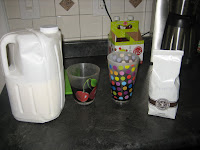Coffee and the Wayback Machine: Drinking Coffee in the 1970's

At this very moment, we are all deeply and beautifully mired in one huge "historical moment" also known as "a time of historical significance" and it is really wonderful. It feels very good. It's as if you want to capture it and then pause and replay at will to keep this feeling that anything is possible. That is not to say that there aren't terrible, harsh reminders of an equally disturbing reality---just that right here, we will soon be celebrating the inauguration of a new President.
Pondering the notion of thousands of years can be depressing and maybe even disorienting, but when I find myself in that space, I brace myself with a cup of coffee. Coffee itself boasts a history that is long, vivid, and celebrated. This august beverage was first "discovered" by the Ethiopian goatherder Kaldi in 850. Starting around 1000, the Turks took over by cultivating coffee and by 1475, there were signs of a burgeoning coffee shop trend when Kiva Han was opened in Contsantinople. At that point, the trend spread to Italy, England, and the rest of Europe. Although there wasn't a lot of coffee shop action in the early days of colonial America, at least people were able to drink coffee at home starting in the early 1600's.
Taking a future-forward, back-in-the-day look at coffee culture can be fun. And thinking about coffee-drinking in the 1970's can be a blast. In 1975, the New York City-based journalist, Sonny Klein, wrote an article for New Times. The cover featured a woman who reminds me of Gloria Steinem (but probably isn't) drowning in a cup of coffee. Although her hands are signaling, "help me I'm drowning" the expression behind her sylish owl-frame glasses is oddly alert.
To open his article, Kleinfield created a little coffee check list, suggesting that coffee is "as addictive as cocaine" and "harmful to people under stress". He also added that coffee is "good for your chess game" and the fourth largest commodity in the world. Thirty-three years later, coffee is the second largest export in the world---and is no longer classified as a harmful vice.
But Kleinfield's coffee expose is not terribly anti-coffee. New Times was a NYC-based publication, chock full of cigarette ads. The coloration is fascinating---various types of 2-color print efforts, as well as a sepia-like coloration in most photographs. The writing is right-on. According to Kleinfield, "The beverage's place in American social life is unassailable." He also calls it "symbolic of the American way of life". He asks rhetorically, "How many couples have begun an acquaintance and how many businessmen have consummated a deal over a cup of coffee?"
Though Kleinfield describes a zeitgeist that feels familiar to coffee lovers, there are some references that are wholly out of date, and totally fascinating. For example, the idea of coffee wagons that used to go up and the down the halls of offices---definitely way before the glorious advent of Starbucks onto the scene. Mr. Kleinfield's article roams far and wide, describing coffee drinking during the Renaissance, cultivation of coffee in 55 countries mainly in Latin America and Africa, and the fact that on a typical winter day in 1962, 74.7% of Americans drank an average of 3.1 cups of coffee (an average daily consumption, by the way, that has not changed.) He notes that electric-drip makers were the fastest growing segment of the coffee-brewing market in 1975 and that coffee houses were "sprouting like weeds" around the United States. The medley of facts is very prolific and engaging, but once he moves onto the topic of health, the completely misguided alarmist, coffee-as-vice approach becomes evident.
Kleinfield discusses the notion of "caffeinism" which he describes as a set of awful symptoms---insomnia, palpitations, fever, weight loss, and upset stomach. Experts weigh in and everyone wrings their hands over this evil vice. Finally, there is the coup de grace statement: "Accumulated suddenly, the amount of caffeine in 100 cups of coffee would be lethal." Well, yeah, that is not completely unthinkable---but even I can't drink 100 cups of coffee "suddenly".
Mr. Kleinfeld is an excellent writer and from his fine article---with its charming, retro views of coffee, one gets the sense that he's a fatalist. He will drink his coffee no matter what. His closing lines resonate with deep coffee love, but he is sadly unaware of the numerous health benefits of coffee. He concludes, "Pour coffee into a cup. Firmly clamp your left hand to your right wrist to calm the caffeine tremors. Forget about your kidneys. Forget about your bladder. Forget about your heart. Swig it and enjoy it."
Now---future-forward to the 21st century. President-Elect Barack Obama is one week away from being sworn in. There are no cigarette ads in magazines (at least not that I'm aware of), and coffee is good for our health and may even help us live longer!
Can you dig it?


Comments